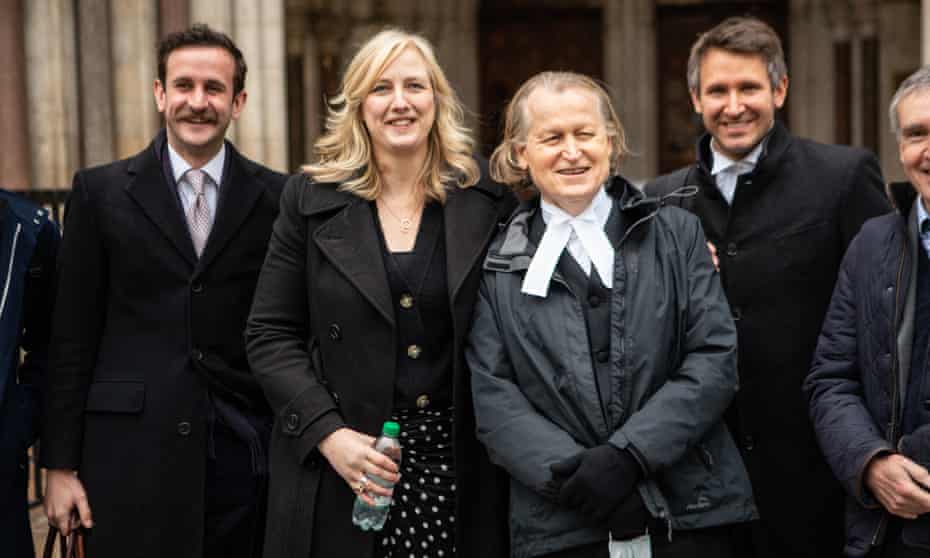Arron Banks almost crushed me in court. Instead, my quest for the facts was vindicated

L
I had been braced to lose and I knew exactly what would happen if I had. The headlines I would face, the accusation that I was – what my detractors have always claimed – a “conspiracist”, the social media shitstorm that would ensue. I had no doubt about how devastating it would be because every step of this litigation has felt as if it was aimed at trying to crush me. In large part, it’s succeeded.
The lawsuit was directed at 24 words I used in a Ted Talk in 2019 but my history with Banks goes back much further. The entire investigation that would uncover the Facebook-Cambridge Analytica scandal began in 2016 with a series of denials from the firm about its relationship with Leave.EU.
That investigation led not just to record fines against Facebook and Mark Zuckerberg being dragged before Congress, but to findings that Banks’s Leave.EU campaign had broken both electoral and data laws. But it was our revelations in this paper about his relationship with the Russian government that hit a nerve. Banks reported me to the police. He accused me of computer hacking and then blackmail.
And then a year later, he sued.
Over these words that I told the audience at Ted’s main conference in Vancouver: “… and I’m not even going to get into the lies that Arron Banks told about his covert relationship with the Russian government”.
I thought the meaning of these words was blindingly obvious. That he’d told lies about his covert relationship with the Russian government! I was wrong. In November 2019, as part of the hearing to determine the “legal” meaning of the words I had used, Mr Justice Saini came up with his formulation, not the one I thought the words had meant; not even the one Banks had advanced. He contended that I’d said he’d had “a secret relationship with the Russian government in relation to acceptance of foreign funding of electoral campaigns in breach of the law”.
It felt like I’d stepped into the pages of a Kafka novel. The judge’s ruling meant that I was going to be put on trial to defend the truth of a statement I’d never actually said or meant.
When news broke that I’d withdrawn the truth defence and would instead be defending it only on public interest, it sent the rightwing media system into meltdown. A tsunami of abusive articles, tweets, pronouncements from commentators and MPs, the low point of which was when the director of the Orwell prize rang me to say that of course they wouldn’t be asking for my prize back as the Spectator was demanding, but they’d taken it sufficiently seriously to take legal advice.
I don’t know if it was because these smears against me stuck or if our entire press had been rendered mute in the face of Banks’s legal threats, but the near total silence around this case has been one of its most extraordinary aspects.
One month before Russia invaded Ukraine, as part of the legal action, documents disclosed by both me and Banks provided new insight about the relationship between the biggest funder of the Brexit campaign and the Kremlin in a multimillion pound trial against a journalist that 19 press freedom organisations said they believed was an abuse of law. Much of this went wholly unreported. Save for the Guardian, not a single mainstream news outlet covered any of it.
I’m writing this today because the law must change. We cannot and must not allow another journalist to go through this. Not for the sake of their sanity but for the health of our democracy. Because this is not democracy. It’s oligarchy. And Banks v Cadwalladr needs to be the last time these obscene laws are used against a journalist in this way.
What this case proves is that no journalist is safe. The judge, Mrs Justice Steyn, said that Banks’s case against me was not a “Slapp” suit, that is a strategic lawsuit against public participation. She said his attempt to seek vindication through the proceedings against me was legitimate. She is correct because it couldn’t be. There is no definition of a Slapp suit in UK law, which is why none of what I believe to be the abusive aspects of this case were entered into evidence. They formed no part of my defence, one of the things I found most upsetting after the trial.
However, the judge clearly states in her judgment that the Observer had previously published a report containing “essentially the same allegations, and a very similar meaning”. But Banks didn’t sue the Observer and he didn’t sue Ted, he sued me. He presumably thought I was the weakest link. He was wrong. But only because an incredible sea of people rose up to support me. I relied on the generosity of my legal team and the kindness of strangers: 28,887 people who contributed the astonishing sum of £819,835 to my two crowdfunders. Even writing that makes me tear up.
It would have been utterly impossible for me to defend myself without this support. It was only barely possible even with it. But if I hadn’t done so, some key facts about the political moment that changed our country forever – Brexit – could have been rewritten.
The ability to report on the Kremlin’s involvement with leading individuals in the Brexit campaign would have been stifled forever. The record could have been changed.
This is because what the coverage of the case last week missed, and what lay readers of the judgment probably won’t understand, is what an extraordinary document it is. Not just for what it means for all UK news outlets in terms of a public interest defence succeeding, but for a forensic examination of the facts of Banks’s relationship with the Russian government that is on the record forever.
I was blown away reading it. Mrs Justice Steyn painstakingly undertook her own examination of the accuracy of Banks’s claim that his “sole involvement with the Russians was a boozy six-hour lunch”. That is what he claimed after the Electoral Commission announced it would investigate the “true source” of his £8m donation to the Brexit campaign. And this is what she found. That statement was, she said, “wholly inaccurate”.
She examined all the underlying documentation, including evidence newly revealed in the case, and concluded “he had at least four meetings, including three lunches”. She added: “It would be wrong to expect a journalist to refrain from identifying such an inaccurate statement… as a lie.”
But it doesn’t end there. She noted: “The four meetings on 6 November 2015, 17 November 2015, 19 August 2016 and 18 November 2016 were probably not the full extent [of] Mr Banks’s meetings with Russian officials.” There were reasonable grounds to believe numerous other meetings occurred. She regards Banks’s words in an email on 19 January 2016 that he intended “to pop in and see the ambassador as well” were “suggestive of a relationship in which he could visit the Russian ambassador with ease”.
She said the statement by Andy Wigmore, spokesman for the Leave.EU campaign and Banks’s business partner, about why he retracted his claim that Banks was in Moscow in early 2016 as “not credible”. Nor was Banks’s claim that he received a document entitled “Russian gold sector consolidation play” from a British associate, not a Russian oligarch.
Boris Johnson’s government came to power on the coat-tails of Brexit. It has refused to investigate Russia’s continuing attacks on western democracy and our information systems. Johnson personally intervened to delay publication of the Intelligence and Security Committee’s Russia report. He continues to refuse its demand for an inquiry.
The only information we have about Russia’s efforts has come from US investigators and a handful of journalists. And now this judgment.
The personal, physical, psychological and professional toll of fighting this case has been profound. But it’s not my win, it belongs to the legal team and the 28,887 people who stood alongside me. Banks could still decide to appeal against Mrs Justice Steyn’s interpretation of the law. But not the facts.
Whatever happens next, we have these now. We held the line. There were at least four meetings between the main funder of the Brexit campaign and the Russian government. There are reasonable grounds to believe there were many more. Fact.

Geen opmerkingen:
Een reactie posten
Opmerking: Alleen leden van deze blog kunnen een reactie posten.